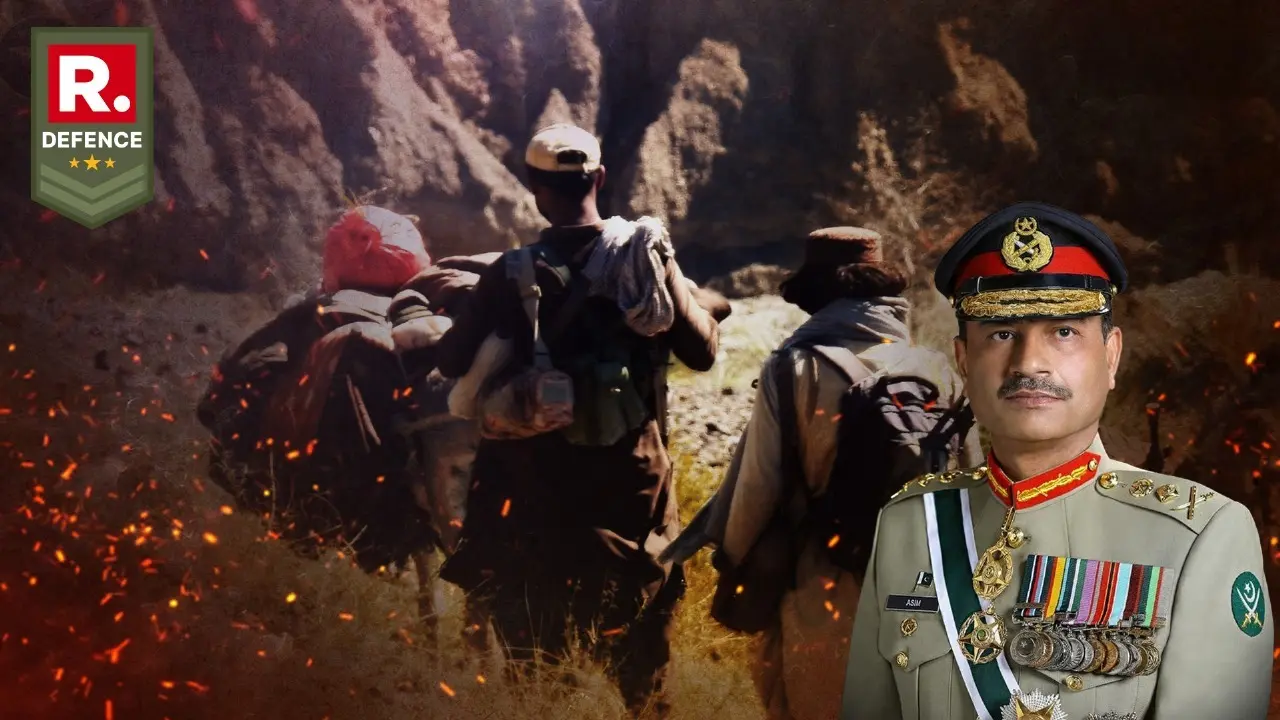Updated 17 April 2025 at 19:03 IST
Pakistan’s Gen Asim Munir Talks Tough, But Balochistan Unrest Mocks Army Chief’s Big Words
While Munir portrayed insurgents as a dwindling force, reports from Balochistan suggest a deepening trust deficit and increased militarisation.
- Defence News
- 4 min read

Islamabad, Pakistan – In a convention filled with patriotic fervour and televised slogans, Pakistan’s Chief of Army Staff, General Asim Munir, took the stage at the Overseas Pakistanis Convention on April 16 to deliver what many are calling a rallying cry against separatist militancy in Balochistan. “Even ten generations of terrorists cannot harm Balochistan and Pakistan,” he declared while asserting the military’s unity with the people and vowing to “beat the hell out of these terrorists very soon.”
But beyond the soundbites and rhetorical punchlines, the situation on the ground in Balochistan tells a different story. The region has been rocked by a sustained insurgency, mounting public anger, and allegations of extrajudicial operations. Many in Pakistan’s own strategic circles admit that the military has yet to contain the surge of asymmetric threats emanating from the southwest.
Jaffar Express Hijack Left Over 200 Hostages Dead, Military’s Narrative Questioned
Munir’s statement comes weeks after one of the most audacious acts of Baloch militancy in recent history: the March 11 hijacking of the Jaffar Express near Mach, which ended in a two-day military rescue op. While the Pakistan Army claims that 33 rebels were neutralised and hostages rescued, the Baloch Liberation Army (BLA) released a conflicting statement alleging that 214 hostages were killed after the state ignored their ultimatums.

The truth may lie somewhere in the shadowy middle. But what remains indisputable is that militant groups have grown bolder, striking with increasing frequency and sophistication. From ambushes and targeted assassinations to coordinated attacks on infrastructure, Baloch fighters have managed to keep the state machinery on edge despite intensified crackdowns.
Advertisement
And yet, Munir’s speech struck a tone of denial—portraying the rebels as a negligible force of “1500 terrorists,” even as military convoys in the region continue to move under heavy escort and entire districts remain under night-time curfews.
Critics See Munir’s Bravado as a Cover for Strategic Anxiety in Rawalpindi
Behind the scenes, analysts believe the Pakistan Army is increasingly rattled. Balochistan’s terrain favours the insurgents, and efforts to co-opt locals through state-backed militias have yielded limited success. Reports from the region suggest that the Army has been leaning more on aerial surveillance, drones, and even shelling of suspected hideouts—a sign of frustration rather than control.
Advertisement

While Munir praised overseas Pakistanis for their commitment and spoke of national unity, there was no mention of the disappearances, checkpoints, or media blackouts that plague everyday life in Balochistan. Human rights groups have documented rising numbers of enforced disappearances over the past year, often with families alleging Army involvement.
The military’s grip on the province remains heavily securitised, but not necessarily stabilised. Socio-economic development plans are routinely announced, yet rarely materialise. Locals are increasingly disillusioned with the ‘development through force’ model that the state seems to be perpetually applying.
The Military Sees Itself As A National Saviour, But The Trust Deficit In Balochistan Deepens
In a bid to widen the emotional appeal of his speech, Munir also referenced the crisis in Gaza, saying “The hearts of Pakistanis beat in unison with the Muslims of Gaza.” But many critics quickly pointed out the irony—drawing parallels between the military’s sympathy abroad and its silence at home, where civilians in Balochistan often feel like they are living in a warzone.
His remarks may resonate with nationalist segments, but for the Baloch population, they do little to ease the sense of isolation and alienation. A decade-old rebellion is now entering a more organised phase, powered by social media, youth recruitment, and deeper ideological roots. No amount of chest-thumping rhetoric can undo that trend unless serious political and economic concessions are offered.
Munir’s message was loud but not necessarily clear. The bravado may play well in Islamabad, but in the hills of Kohlu or the deserts of Panjgur, the question remains: can the military afford to keep pretending this is a battle of perception when it has already lost the trust of the people?
Watch- Why is Balochistan Fighting For Freedom? Baloch Journalist Explains
Published By : Yuvraj Tyagi
Published On: 17 April 2025 at 19:03 IST
